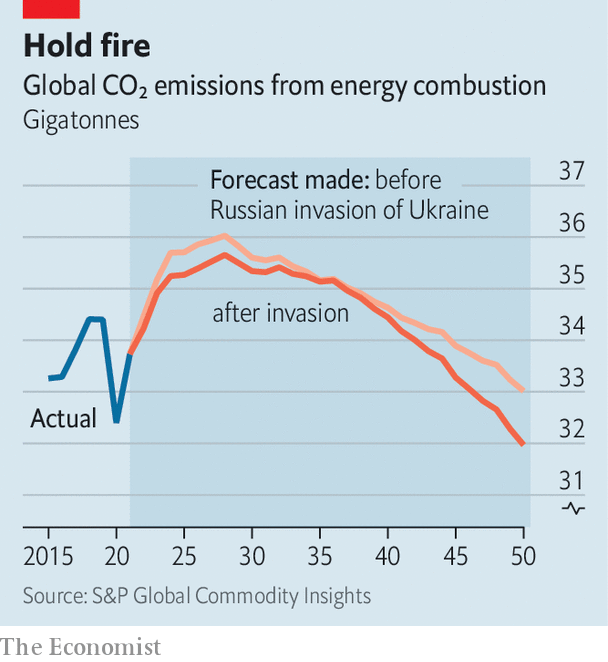The cheat button
How communicating better can unlock positive feedback loops on the climate
The reason why I’m hard on so much current climate communications is that cleaves too closely to a particularly negative vision of the climate challenge. I think this is both outdated and contrary to what we’re actually trying to achieve. And a key part of the reason is that much more positive and optimistic dynamics are not just at play, but can be unlocked by a change in the tone of climate communications.
To repeat, the big challenge is now to build political support for seizing the opportunities and possibilities of a necessary shift to a low-carbon economy. The bigger and more widely based this is, the sooner it’ll happen, and the greater the spoils to those who get their economies configured the quickest. Stop squawking about sacrifice or doom, and start talking to more people about more good stuff.
A while ago I pointed to the Economist’s excellent reporting on the potential of the North Sea basin’s economy as an example of the kinds of shifts we’ll be seeing more of. Now another set of reports from My Favourite Newspaper™ has landed and added another layer onto what I want to talk about.
In this case it’s this piece in the Finance & Economics section: “War and subsidies have turbocharged the green transition”. The argument is that the switch is underway and is picking up momentum – including because of the Ukraine War – and this already looks like it’s taken 10 years off the transition timeline.
Source: The Economist
Good news, of course, but why bring it up here? The reason is that this points to a key dynamic where good things compound just as bad things do.
On the bad side there are terrible things that can pick up speed. Think of melting ice caps meaning less white to reflect sunlight back into space, while also releasing methane from melted permafrost and bringing about greater risk of sub-arctic forest fires. This then leads to more ice cap melt and the whole damn thing keeps going. Dreadful stuff.
But similarly there are important things that compound on the good side, that also need emphasising. Virtuous feedback loops exist in tech ecosystems, where the more that is adopted then seeds markets, bringing about everything from economies of scale and spinoff applications to investment in supporting infrastructure, new innovations and technologies, and greater public acceptance. Think of EVs, for example. A couple of virtue-signalling Toyota Prius owners a decade ago changed nothing. But once it hits the mainstream it snowballs.
One critical lesson about EVs in this later stage, incidentally, is that they will succeed not necessarily because they’re better for the environment, but because they’re better full stop. Not in every way, but for many ways that we use cars in the modern world a big battery with wheels and seats is better than an explosion machine clad in steel and clouds of smoke. Similarly a kitchen device that uses less water and energy while being more controllable is a good thing, as is a well-insulated house or a meal from more local ingredients.
David Roberts’ excellent Substack/podcast, Volts, has two other terrific examples of dynamics that can unlock solutions to the climate crisis and shift us towards a whole new world of nectar and ambrosia. This one is about how certain clean energy technologies are progressing on a ‘learning curve’, crunching the numbers about forecasting tech costs in a novel way and coming up with dynamite:
“If we deploy [clean energy technologies on learning curves] fast enough reach net zero by 2050, as is our stated goal, then they will become very cheap indeed — cheap enough to utterly crush their fossil fuel competition, within the decade. Cheap enough that the most aggressive energy transition scenario won't cost anything — it will save over a trillion dollars relative to baseline.”
It’s based on this paper in the journal Joule. Sample text:
“…we find that compared to contuinuing [sic] with a fossil fuel-based system, a rapid green energy transition is likely to result in trillions of net savings. Hence, even without accounting for climate damages or climate policy co-benefits, transitioning to a net-zero energy system by 2050 is likely to be economically beneficial.”
The other Volts podcast is about something even less easy to grasp: the role of social change in climate models. In essence fuzzy things from social change to politics are hard to model, especially when dealing with utterly complex systems like climate change. So they’re not included. But they are crucial – think of the feedback loops that amplify take-up of tech such as EVs, of political pressure for more environmental policy outcomes such as the clean energy switch, or the impact of the Ukrainian War on how Europeans feel about energy.
There are two important points to make about these dynamics from the communications perspective.
Firstly they’re a real source of encouragement, of the fact that it’s not just sacrifice or doom, and that it’s possible to not just win this war but really benefit from doing so.
Secondly they’re potentially the result of good communications: as I’ve argued in earlier Substacks, political will is the critical ingredient for climate change, and communicating the right way to the mass of people is vital for making this happen.
So there you go: be positive and it’s like finding a cheat button. More when I can.




